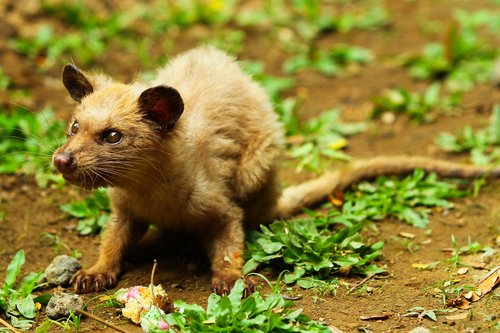Over the weekend I learned something a bit disheartening.
I’ve been living a lie.
Back in 2009 and 2010 I had an insatiable coffee addiction. I couldn’t get enough.
I would drink cappuccinos as appetizers before lattes and chug down cups of black coffee as if they were cups of cool water on a hot summer day.
A friend of mine was working at this high fallutin’ coffee shop in Palo Alto at the time. I think it was called Caffe Del Dogge.
They had a great selection of their own coffee blends, but they also carried some “special” coffees.
One of them was called Jamaica Blue Mountain. I don’t remember why it was special, but it was really delightful and smooth. I tried a cup of it once. Wonderful.
But the crown jewel of their “special” coffee collection was called Kopi Luwak. This was coffee that was hand-plucked by special civet-coffee hunters in Burma (I think). They would stalk the jungle floor, looking for the droppings (sh*t) of these squirrel-like animals called civets.
Before you close this email, let me tell you why they were engaging in this bizarre behavior.
Civets are supposedly connoisseurs of the finest coffee cherries (coffee beans are found inside of coffee cherries). They only eat those that have hit peak ripeness.
The beans of these perfectly ripe cherries then get bathed in the special stomach acid of these civets—which causes the coffee beans to lose much of their bitterness. Finally, after an intestinal roller-coaster, the beans get scattered across the jungle floor in civet poop.
These brave civet-coffee hunters then hunt down and pick up these droppings, wash them off, and then roast the beans. The result is, supposedly, a perfect cup of coffee. Only the finest beans from the ripest cherries are selected by the civets, and they are then treated to a special civet-stomach chemical bath that makes them perfect.
Great story, right?
Well, it turns out it’s mostly wrong.
I was talking to a coffee expert friend of mine on Sunday about crazy cups of java. He kept asking me if “I would ever buy a $20 cup of coffee”.
I told him that I already had. “Kopi Luwak”
He looked at me as if I had just told him I was a murderer.
“Seriously?”
“Yeah—it was great. You should try it.”
“You realize how that’s made, right?”
I then jumped into my stock kopi luwak story…
But he cut me off.
“That’s how you think your coffee was made. But that stuff is all made in factory farms these days… Think chickens in cages, man.”
In defense of one of the best cups of coffee I’ve ever had, I jumped into the part of the story where the Burmese squirrels hunt down the perfectly ripe cherries.
“Nope. They mainly eat cherries on the ground. Over-ripe, rotting cherries.”
I felt a little sad for a moment. Was this magical coffee experience of yesteryear all a lie?
No. I still thoroughly enjoyed the coffee. And I bet my coffee was created in the proper way, before the civet-coffee factory farms (cognitive dissonance, anyone?)
But this whole situation really helped me see the power of a good story.
Good stories make everything better. They make presentations better. They make time with friends better. They make us more attractive and charismatic. They make us like our shoes more (Tom’s, anyone?)… and they make food (and coffee) taste better.
Part of this is due to the power of showing one’s effort & work (a common topic in these emails). We like seeing all of the effort that goes into the stuff we’re consuming. It helps us realize the value.
But our minds also just seem to be built to grasp and remember stories exceedingly well. Many mnemonic techniques are based upon this fact.
So, when in doubt, tell a story. A story can transform a piece of fabric and thread into a symbol of rebellion and resistance (or a status symbol). A story can turn an electronics company into a cult (Apple, anyone?). And it can turn a cup of factory-farmed poop-coffee into pure ambrosia.
Until tomorrow,
Jason





